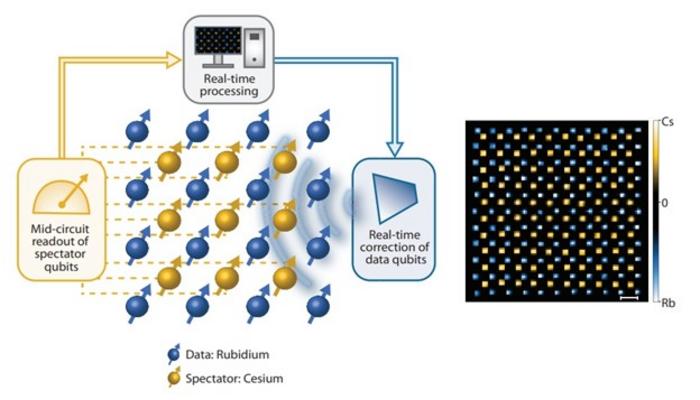Despite their immense promise to solve new kinds of problems, today’s quantum computers are inherently prone to error. A small perturbation in their surrounding environment— a change in temperature, pressure, or magnetic field, for instance—can disrupt their fragile computational building blocks, called qubits.

Credit: UChicago – Bernien Lab
Despite their immense promise to solve new kinds of problems, today’s quantum computers are inherently prone to error. A small perturbation in their surrounding environment— a change in temperature, pressure, or magnetic field, for instance—can disrupt their fragile computational building blocks, called qubits.
Now, researchers at the University of Chicago’s Pritzker School of Molecular Engineering (PME) have developed a new method to constantly monitor the noise around a quantum system and adjust the qubits, in real-time, to minimize error.
The approach, described in Science, relies on spectator qubits: a set of qubits embedded in the computer with the sole purpose of measuring outside noise rather than storing data. The information gathered by such spectator qubits can then be used to cancel out noise in vital data-processing qubits.
Asst. Prof. Hannes Bernien, who led the research, likens the new system to noise-cancelling headphones, which continuously monitor surrounding noises and emit opposing frequencies to cancel them out.
“With this approach, we can very robustly improve the quality of the data qubits,” said Bernien. “I see this as being very important in the context of quantum computing and quantum simulation.”
A daunting challenge
As existing quantum computers are scaled up, the challenge of noise and error has grown. The problem is two-fold: Qubits easily change in response to their environment, which can alter the information stored inside them and lead to high rates of error. In addition, if a scientist measures a qubit, to try to gauge the noise it has been exposed to, the qubit state collapses, losing its data.
“It’s a very daunting and difficult task to try to correct the errors within a quantum system,” said Bernien.
Theoretical physicists had previously proposed a solution using spectator qubits, a set of qubits that don’t store any necessary data but could be embedded within a quantum computer. The spectator qubits would track changes in the environment, acting like the microphone contained within noise-cancelling headphones. A microphone, of course, detects only sound waves while the proposed spectator qubits would respond to any environmental perturbations capable of altering qubits.
Two kinds of qubits for noise cancellation
Bernien’s group set out to demonstrate that this theoretical concept could be used to cancel out noise in a neutral atom quantum array— their preferred quantum computer.
In a neutral atom quantum processor, atoms are suspended in place using laser beams called optical tweezers, which Bernien helped develop, earning him accolades such as the 2023 New Horizons in Physics Prize by the Breakthrough Prize Foundation. In large arrays of these suspended atoms, each acts as a qubit, capable of storing and processing information within its superposition state.
In 2022, Bernien and colleagues first reported the ability to make a hybrid atomic quantum processor containing both rubidium and cesium atoms. Now, they’ve adapted that processor so that the rubidium atoms act as data qubits while the cesium atoms are spectator qubits. The team designed a system to continuously read out real-time data from the rubidium atoms and, in response, tweak the cesium atoms with microwave oscillations.
The challenge, Bernien said, was ensuring that the system was quick enough— any adjustments to the rubidium atoms had to be nearly instantaneous.
“What’s really exciting about this is that not only is it minimizing any noise for the data qubits, but it’s an example of actually interacting with a quantum system in real time,” said Bernien.
Proof-of-principle
To test their error minimization approach, Bernien’s group exposed the quantum array to magnetic field noise. They showed that the cesium atoms correctly picked up this noise and their system then cancelled it out in the rubidium atoms in real time.
However, the research group says the initial prototype is just a starting place. They’d like to try increasing the amount of noise and varying the types of perturbations and testing whether the approach holds up.
“We have exciting ideas on how to improve the sensitivity of this system by a large factor but it’s going to take more work to get it implemented,” said Bernien. “This was a great starting place.”
Eventually, Bernien imagines a system of spectator qubits could run constantly in the background of any neutral atom quantum computer and also quantum computers of other architectures, minimizing the error as the computer stores data and makes computations.
Journal
Science
DOI
10.1126/science.ade5337
Article Title
Mid-circuit correction of correlated phase errors using an array of spectator qubits
Article Publication Date
25-May-2023




